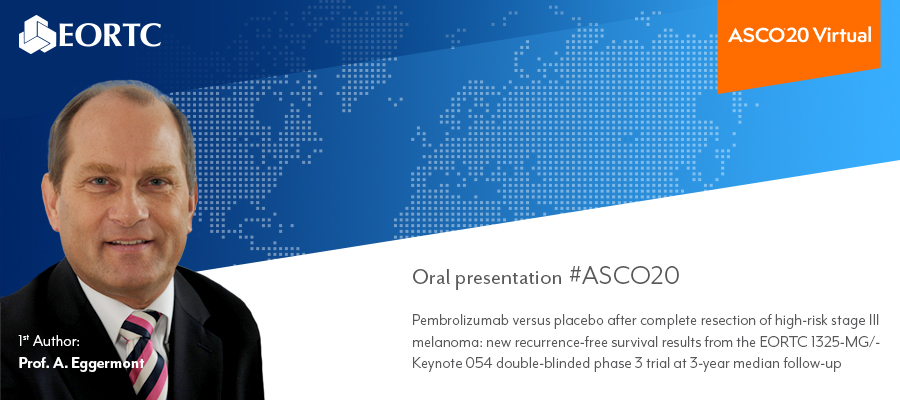EORTC 1325-MG/Keynote 054: Pembrolizumab versus placebo after complete resection of high-risk stage III melanoma: New recurrence-free survival results at three-year median follow-up
29 May 2020
Today, Professor A.M.M Eggermont presented the updated efficacy results of the phase III double-blind EORTC 1325/KEYNOTE-054 trial to evaluate pembrolizumab vs placebo in patients with resected high-risk stage III melanoma.
Patients with stage III melanoma usually undergo surgery to remove the primary melanoma and the nearby metastasized lymph nodes. However, successful removal of melanoma through surgery, does not guarantee that patients will be cancer free. Pembrolizumab, an immune checkpoint inhibitor antibody, has been shown to stimulate the body’s immune system to remove remaining melanoma cells. After recovery from the lymph node surgery, the phase III double-blind EORTC 1325/KEYNOTE-054 study compared the administration of pembrolizumab and placebo, for a maximum of year. In 2018, at a 1.25-year median follow-up, this study showed that pembrolizumab treatment yielded a 43% reduction of their risk of melanoma recurrence or death as compared to placebo treatment, i.e. prolonging recurrence-free survival. These findings led to the approval of pembrolizumab for resected high-risk stage III melanoma patients by EMA in 2018 and by FDA in 2019.
In this study, 1019 patients were randomized to pembrolizumab (514 patients) or placebo (505 patients). A dose of 200 mg was given every three weeks for over a year or until there was disease recurrence or unacceptable toxicity. Two primary endpoints were assessed, recurrence free survival from randomization in the overall population and those patients with PD-L1 positive tumours. This abstract presents, a new, up-to-date evaluation of recurrence free survival at a 3-year median follow up.
Professor Eggermont showed that, adjuvant administration of pembrolizumab provided a sustained prolongation of recurrence free survival compared to placebo. In the overall population, the 3-year recurrence-free survival (RFS) rate was 64% (pembrolizumab group) vs 44% (placebo group). The improvement was consistent across all tumour and stage subgroups. Importantly, in BRAFmutant patients the RFS rate difference was 25% (62% vs 37%) and in BRAFwild type patients it was 16% (62%-46%), demonstrating a significant benefit irrespective of mutational status In the overall population, the 3-year cumulative incidence of distant metastasis as the first recurrence was 22% (pembrolizumab group) vs 37% (placebo group). These results confirm the clinical utility of pembrolizumab in the adjuvant setting in resected high-risk stage III melanoma.
“Pembrolizumab adjuvant therapy provides a clear and sustained relapse free survival benefit to stage III melanoma patients irrespective of stage subgroup or mutational status. We expect these benefits to be also consistent across endpoints at long term follow up” said Professor Alexander M.M. Eggermont, study chair of this study, Chief Scientific Officer and Professor of Surgical Oncology at Princess Máxima Center, Utrecht, The Netherlands
Research Funding: Merck
- Session Type: Oral Abstract Session
- Session Title: Melanoma/Skin Cancers
- Track: Melanoma/Skin Cancers
- Subtrack: Other
- Abstract #: 10000
- Clinical Trial Registry Number: NCT02362594
- Citation: J Clin Oncol 38: 2020 (suppl; abstr 10000)
- DOI: 10.1200/JCO.2020.38.15_suppl.10000
Related News
EORTC: Advancing research and treatment for rare cancers
29 Feb 2024
EORTC Fellowship Programme: celebrating more than 20 years of impactful collaboration
22 Feb 2024
Appointment of Malte Peters as EORTC Strategic Alliance Officer
9 Feb 2024
Unique series of workshops in partnership with the European Medicines Agency (EMA)
7 Feb 2024
EORTC launches a prominent clinical trial in older patients with locally advanced (LA) HNSCC (Head and Neck Squamous Cell Carcinoma)
14 Dec 2023
Seven IMMUcan abstracts selected for ESMO Immuno-Oncology Congress 2023
6 Dec 2023
EORTC Quality of Life measures integrated in CDISC
20 Nov 2023
EORTC and Immunocore are collaborating to launch the ATOM clinical trial of tebentafusp in Adjuvant Uveal Melanoma
7 Nov 2023
Treatment with decitabine resulted in a similar survival and fewer adverse events compared with conventional chemotherapy in older fit patients with acute myeloid leukaemia
31 Oct 2023
New results and forthcoming EORTC trials in rare cancers, lung, head and neck, and breast carcinomas presented at ESMO 2023
20 Oct 2023


